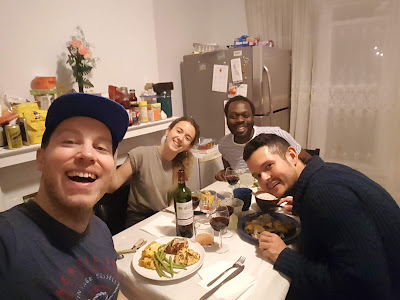Modern art and writing and always been preoccupied with the link between technology, man's attempt to make machines intelligent, and 'how society should be.' Whether you call that education, political systems, etc. these topics seem to always intersect and produce interesting ideas and thought provoking discussions. Below are some thought-provoking novels that talk about AI being a real focus on human error and machine error:
Modern writers today are constantly working to unearth the human problems we will face in the future. Some of them are happening now, such as test algorithms in Britain:
"To determine each student’s results, the U.K. decided to use an
algorithm that looked at their mock exam results, as well as their
school’s track record in the exams. Lawmakers said the software would
give students a “fairer” result after concluding teachers could
potentially try to inflate their pupil’s grades.
But
the model ended up favoring students from private schools and affluent
areas, leaving high-achievers from free, state-schools
disproportionately affected. Many students have had their university
places revoked as a result of the downgraded exam results, and there
have been protests as a result."
One of the fastest growing technology sectors is education. But policy, ethics, and the general public have not caught up with where technology is heading.
Technology to educate is a double-edged sword. It can aid teaching, and it can remove the humanity involved in learning, which is the subject of many a page-turning novel. If you ever read Victor Frankl's book Man's Search for Meaning, he talks about central themes of how they survived in what could only be considered the most inhumane, and the most wrong kind of circumstances for innocent people.1) Purposeful work 2) Love 3) Courage to face difficulty. Educational systems that have successful students are built around similar concepts. Most teachers I know truly have a calling to caring for children and wanting to see them grow. They also benefit, it's a good cycle.
The reason that algorithms and education are so problematic when put together is because they remove the human capacity for free will in most cases. There are cases where algorithms are very helpful, and they remove the common logical errors and fallacies that humans might commit (favoritism, etc.) and focus on what are the results. But algorithms can remove the purposeful work and the friction required to achieve for students. And some students thrive on that friction to push them to succeed.
Most professional, reputable organizations of learning are interested in one thing: learning outcomes. This is what educational specialists of all walks of life want: for the student the learn and to thrive as part of that learning. And with that, comes the work required to learn. But policy that puts technology first, things that remove helpful friction, are really not helpful at all, but a sense of false charity to a student. And especially marginalized students, technology rarely helps them, but helps those who were already fine without the help, it's a sense of false charity.
“ False charity constrains the fearful
and subdued, the "rejects of life," to extend their trembling hands.
True generosity lies in striving so that these hands--whether of
individuals or entire peoples--need be extended less and less in
supplication, so that more and more they become human hands which work
and, working, transform the world.”
―
Paulo Freire,
Pedagogy of the Oppressed
It is unhelpful to use technology to reform education. Instead, we must ask those in power to reform educational systems to meet the realities and needs of students (and by extension, teachers). Yes, perhaps someday an AI teacher will be a good as a real one. But the principles and ethics of learning, teaching and discovery are not something we can ever hand over to AI overlords. There is no virtue in that, and no humanity. We will still have parents, families (of some kind) communities that will help raise us, help us learn. We will still need each other, and not just a cold monitor.
I do think a lot of these technological advances are good things. Triplicate papers, typewriters, the quill pen, good riddance to writing things this way for educational purposes; there are better ways. Computing power has improved the power of human knowledge and its applications, but it has yet to improve the decisions we make when interacting with each other.
Educational systems, as we will see in September, are a type of normalcy that we heavily rely on. Indeed, we will see just how heavily we rely on these educational systems and their technological counterparts in the coming years.
August 22, 1920, is Ray Bradbury's birthday. I'm sure it's no coincidence that the popularity of dystopian fiction is rising. Someday, people of the future may say we lived it.















